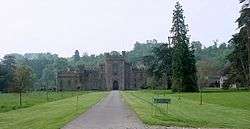Fitzwilliam Coningsby
Fitzwilliam Coningsby (died August 1666) was an English politician who sat in the House of Commons in 1621 and in 1640. He supported the Royalist cause in the English Civil War.
Coningsby was born at Hampton Court, Herefordshire, the son of Sir Thomas Coningsby and his wife Phillipa Fitzwilliam daughter of Sir William Fitzwilliam of Milton.[1] He was High Steward of Leominster in 1605.

In 1621, Coningsby was elected Member of Parliament for Herefordshire.[2] In 1625 he inherited Hampton Court on the death of his father. He was High Sheriff of Herefordshire in 1626-27 and 1642-43.
In November 1640, Coningsby was elected again as MP for Herefordshire in the Long Parliament, but was expelled in 1641 for being a monopolist,[2] He was one of the "Nine Worthies" - nine justices who formed the royalist leadership in Herefordshire in the summer of 1642. The other "worthies" were Sir William Croft, Wallop Brabazon, Thomas Wigmore of Shobden, Thomas Price of Wisterdon, William Smallman, Henry Lingen, William Rudhall and John Scudamore.[3]
He fought for the King throughout the Civil War till in 1646 he is found at the siege of Worcester, protesting against the surrender of the city by the Royalist commander . Fitzwilliam then went into exile and suffered heavilly in the sequestration of his estates, his wife Cecilly and his children being reduced to comparative poverty. His petitions and those of his wife and of his sons, with the counter petitions of his tennants and of Sir Thomas Allen to whom the bulk of his estates had been granted occupy six pages (2064–71) of the Callendar of the Committee for Compounding, etc., and in 1653 he was still desperatly pleading "the starving condition" of himself and his family. At the restoration Fitzwiliam recovered his estates.
Coningsby died in 1666 and was buried on 23 August 1666 at Hope under Dinmore, Herefordshire,
Coningsby married Cecily Neville on 12 July 1617 at St. Alphage, London. They had children Cecilia, Philippa, Humphrey, Thomas and Henry. Humphrey Coningsby replaced his father in the Long Parliament and was the father of Thomas Coningsby, 1st Earl Coningsby
References
- ↑ Lee, Sidney (1887). "Coningsby, Sir Thomas (d 1625), soldier". Dictionary of National Biography Vol. XII. Smith, Elder & Co. Retrieved 2008-02-27. The first edition of this text is available as an article on Wikisource:
 "Coningsby, Thomas (d.1625)". Dictionary of National Biography. London: Smith, Elder & Co. 1885–1900.
"Coningsby, Thomas (d.1625)". Dictionary of National Biography. London: Smith, Elder & Co. 1885–1900. - 1 2 Willis, Browne (1750). Notitia Parliamentaria, Part II: A Series or Lists of the Representatives in the several Parliaments held from the Reformation 1541, to the Restoration 1660 ... London. pp. 229–239.
- ↑ Ian Atherton Ambition and failure in Stuart England
| Parliament of England | ||
|---|---|---|
| Preceded by Sir John Scudamore Sir Herbert Croft |
Member of Parliament for Herefordshire 1621 With: Sir John Scudamore |
Succeeded by Sir John Scudamore Sir Robert Harley |
| Preceded by Sir Robert Harley Sir Walter Pye |
Member of Parliament for Herefordshire 1640–1641 With: Sir Robert Harley |
Succeeded by Sir Robert Harley Humphrey Coningsby |